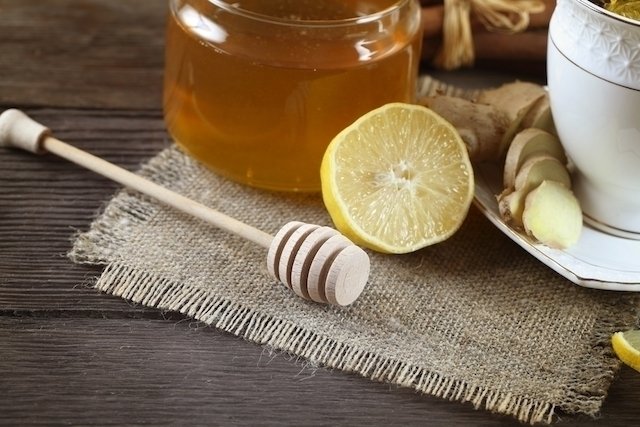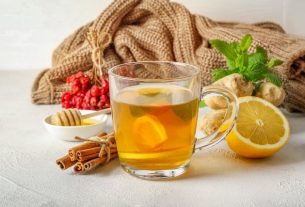A great home remedy for coughs is guaco and carrot juice which, due to its bronchodilating properties, is capable of relieving coughs with phlegm and promoting well-being. Furthermore, ginger tea with lemon is also a good option, being recommended for dry coughs due to its anti-inflammatory and antiseptic action.
To complement these home remedies, you can also drink a glass of water at room temperature with 1 spoon of honey, as it helps to hydrate the vocal cords, calming the entire throat region and reducing coughing fits.
However, it is important to consult an otorhinolaryngologist to identify the cause of the cough, especially when it is constant, so that the best treatment can be indicated. Check out the main causes of persistent cough and what to do.
Some home remedy options to stop coughing are:
1. Ginger tea with lemon
To treat a dry cough, a great home remedy is ginger tea with lemon, which has anti-inflammatory properties, helping to reduce irritation in the throat and lungs, as well as decongesting the airways and relieving dry cough.
This tea can also be used as a home remedy for coughs in children, as it has no side effects.
Ingredients
- 5 g of ginger root;
- Juice of 2 lemons;
- 1 teaspoon of honey;
- ½ liter of water.
Preparation mode
To prepare this remedy, boil the ginger and water over low heat until the mixture is reduced to half its initial volume and then turn off the heat, strain and add the lemon juice. At the end, 1 teaspoon of honey can be added to sweeten. Honey should not be used for babies under 2 years of age.
You should take 1 tablespoon of this tea every 4 hours, while the cough persists. Find out more options on how to get rid of a dry cough.
2. Lemon tea with honey
A baby’s cough can be controlled through the use of some home remedies, such as lemon tea with honey, however, it should only be used in babies over 2 years old, as before this age the baby does not have a fully well-developed immunity. .
Lemon tea with honey helps relieve coughs, nasal congestion and sore throats and is also good for improving digestion.
Ingredients
- 500 mL of water;
- 2 tablespoons of lemon juice;
- 1 tablespoon of honey.
Preparation mode
Boil the water in the covered pan for about 10 minutes and then add the lemon juice and honey. It should be offered to the baby in small quantities when it is warm.
Another tip is to put a few drops of saline solution in the baby’s nose before feeding and clean the nose with a cotton swab designed for babies, which also helps to relieve coughing. Check out other tips to combat coughing in babies.
3. Guaco juice with carrots
An option for a home remedy for coughing with phlegm is guaco juice with carrots, as it has bronchodilator and expectorant properties, helping to eliminate excess phlegm and allowing you to breathe better.
Furthermore, when adding peppermint to the juice, the anti-inflammatory property is obtained, which reduces coughing attacks, especially in cases of flu, bronchitis or asthma.
Ingredients
- 5 guaco leaves;
- 1 carrot;
- 2 sprigs of mint;
- 1 teaspoon of honey.
Preparation mode
To make the juice, simply mix the guaco leaves, carrot and mint sprigs in a blender. Then, strain and sweeten with 1 teaspoon of honey and drink 20 mL of the juice several times a day.
Another great home remedy option for coughing with phlegm is thyme infusion, as it has expectorant properties, helping to release phlegm and strengthen the immune system. Find out more about what thyme is for and how to use it.
4. Nettle tea
To relieve an allergic cough, it is possible to use some medicinal plants, such as nettle, rorella and plantain, for example, as they have calming properties, relieving discomfort in the throat and, consequently, the cough.
Ingredients
- 1 tablespoon of nettle leaves;
- 200 mL of water.
Preparation mode
To make the tea you need to place the nettle leaves in water and let it boil for 5 minutes. Then strain, let it cool and drink two cups a day. If necessary, you can add 1 tablespoon of honey to sweeten. Discover other home remedies for allergic coughs.
5. Peppermint tea
Peppermint tea is rich in menthol, an essential oil with natural decongestant properties that helps relieve coughs caused by a runny nose or stuffy nose.
Additionally, this tea has anti-inflammatory properties, which help reduce inflammation of the airways and irritation of the sinuses that cause nasal congestion, especially in cases of sinusitis or allergic rhinitis.
Ingredients
- 6 chopped peppermint leaves;
- 150 mL of boiling water.
Preparation mode
In a cup, add the water over the chopped mint leaves and let it rest for 5 to 7 minutes. Strain, sweeten with honey if desired and drink 3 to 4 cups a day.
Another option to take advantage of the decongestant benefits of peppermint is to use the essential oil to inhale. See how to do inhalations with peppermint essential oil.
6. Inhalation with eucalyptus steam
Inhaling eucalyptus vapor helps relieve coughs and nasal congestion caused by respiratory problems, such as asthma, bronchitis, flu, colds and sinusitis, for example.
However, there are some people who may be more sensitive to the essential oil released by eucalyptus and, in these cases, symptoms may worsen. If this happens, you should avoid doing this inhalation.
Ingredients
- 5 drops of eucalyptus essential oil or 1 handful of fresh eucalyptus leaves;
- 1 liter of boiling water.
Preparation mode
Add drops of eucalyptus essential oil to boiling water. Then, cover your head with an open towel, so that it also covers the container containing the eucalyptus essential oil solution.
Tilt your head over the container and inhale the steam as deeply as possible for up to 10 minutes, repeating 2 to 3 times a day. This towel helps keep the solution vapor for longer.
When you finish inhaling, it is important to wipe your face with a towel soaked in cold water. See other ways to use eucalyptus.
Eucalyptus inhalation should also not be used in children under 12 years of age, as it can cause allergies and shortness of breath.
7. Basil tea
Basil tea helps relax and dilate the bronchi, which can help combat respiratory problems and improve coughs caused by flu, colds, asthma, bronchitis or respiratory infections.
Ingredients
- 10 fresh or dried basil leaves;
- 1 cup of water.
Preparation mode
Bring the water to a boil and when it is boiling, turn off the heat. Add boiling water to a cup with basil leaves. Cover and let rest for 5 to 10 minutes. Then strain, wait for it to cool and drink 1 cup, up to 3 times a day.
Basil tea should not be consumed by pregnant or breastfeeding women, as it may affect the baby’s development.
8. Pomegranate infusion
Pomegranate infusion helps fight coughs caused by a sore throat, as it is rich in polyphenols, flavonoids, alkaloids and triterpenes, which are substances with antioxidant and anti-inflammatory action.
Ingredients
- 10 grams of pomegranate peel;
- 1 cup of water.
Preparation mode
Add the pomegranate peels to a pan with water. When it starts to boil, leave it for another 5 minutes and turn it off. After this time, cover the pan and let the tea rest for another 5 minutes. Wait for it to cool down and then drink it 2 to 3 times a day.
Pomegranate infusion should not be used by children under 2 years of age, pregnant or breastfeeding women or by people who have gastritis or stomach ulcers, as it may cause stomach irritation.
9. Watercress and pineapple syrup
Watercress and pineapple syrup is an excellent natural expectorant as it contains bromelain and flavonoids, with expectorant and decongestant properties that loosen phlegm and relieve coughs.
Furthermore, this syrup is rich in vitamins C and A, which help to strengthen the immune system and combat bronchitis, sinusitis and flu, for example.
Ingredients
- 200g de nabo;
- 1/3 of the chopped watercress sauce;
- 1/2 pineapple cut into slices;
- 2 chopped beets;
- 600 mL of water;
- 1/2 cup of honey.
Preparation mode
Blend all the ingredients in a blender, except the honey, and then cook the mixture over low heat for 40 minutes. Wait for it to cool, strain, add 1/2 cup of honey and mix well. Take 1 tablespoon of this syrup 3 times a day. For children, the measure should be 1 teaspoon of coffee, 3 times a day.
This syrup should not be used by pregnant women or people allergic to honey, propolis or pollen.
10. Garlic tea
Garlic tea has expectorant properties, which help fight coughs, as it makes phlegm more liquid, making it easier to eliminate.
Additionally, honey helps lubricate the throat and reduce tissue irritation, relieving coughs.
Ingredients
- 1 crushed or chopped garlic clove;
- 1 tablespoon of honey;
- 1 cup of water.
Preparation mode
Boil the water, turn off the heat and add it to the cup with the crushed garlic. Let it rest for about 5 minutes, strain, wait for it to cool, add honey and drink 1 cup of tea a day.
Garlic tea should not be consumed by children under 2 years of age or by people who have gastritis, ulcers, low blood pressure and bleeding.
Furthermore, in the case of pregnant or breastfeeding women, garlic tea should be used with medical advice, as when used in excess, it can have an abortive effect, affect the menstrual cycle or change the smell of breast milk.
For people allergic to honey, propolis or pollen, honey should not be added to the tea recipe.

Sign up for our newsletter and stay up to date with exclusive news
that can transform your routine!
Warning: Undefined array key "title" in /home/storelat/public_html/wp-content/plugins/link-whisper-premium/templates/frontend/related-posts.php on line 12
Warning: Undefined array key "title_tag" in /home/storelat/public_html/wp-content/plugins/link-whisper-premium/templates/frontend/related-posts.php on line 13




